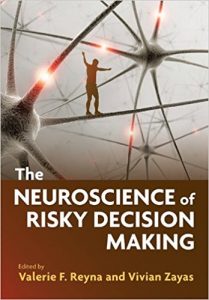Edited by Valerie F. Reyna and Vivian Zayas
 Risky choices about sex, drugs and drinking, as well as diet, exercise, money and health care pervade our lives and can have dire consequences. Now, a new book aims to help us understand the neural roots of bad decisions. The Neuroscience of Risky Decision Making (APA Books) synthesizes the research in this relatively young field for the first time, and introduces new models of brain function to explain and predict risky behavior.
Risky choices about sex, drugs and drinking, as well as diet, exercise, money and health care pervade our lives and can have dire consequences. Now, a new book aims to help us understand the neural roots of bad decisions. The Neuroscience of Risky Decision Making (APA Books) synthesizes the research in this relatively young field for the first time, and introduces new models of brain function to explain and predict risky behavior.
The harm caused by risky decision-making is enormous understanding how the brain processes risks and rewards is the key to unraveling the mystery of irrational decision-making in real life, said Valerie Reyna, Lois and Melvin Tukman Professor of Human Development, Director of the Human Neuroscience Institute in the College of Human Ecology and the Cornell MRI Facility.
We anticipate this work will transform the next phase of research in the field and inform policy and practice innovations that can save lives and improve health and well-being, said Reyna, who co-edited the volume with Vivian Zayas, associate professor of psychology at Cornell.
In the book, leading neuroeconomists, neuroscientists and social scientists discuss recent findings on why people take risks and how risky choices shift in different circumstances and across the life span.

